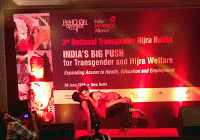I had been there at the 1st National Hijra Habba in 2012. Witnessing the Third National Transgender Hijra Habba in 2015 was indeed a humbling experience as lot of water has flown during these 3 years. From 30 community participants in 2012, the number this year had swelled to a whopping 350+. The landmark Supreme Court (SC) judgement of 2014, recognizing transgenders as the third gender and granting them constitutional rights, seemed to have filled them with a new found confidence that was writ all over their beautiful and smiling faces. And they were just too eager to talk about their experiences and expectations.
Here are some of the sharings I tried to capture (in alphabetical order of their names)--
Dolly Jaan of Mathura finds the police the greatest enemy of transgenders - much worse than the common public - who harass and abuse them no end. Dolly comes from a very conservative Brahmin family and was thrown out of the house at the tender age of 7 years when her father came to know about her Hijra status. The footpath was her home for many years. Later when she grew up she made a name for herself in the hijra community of Mathura. She has adopted two kids of her brother after his death. But she is still ostracised by her family.
Fiza from Lucknow was hesitant to discuss the myriad problems she has faced in life. She has reconciled herself to her fate and is happy making a living out of singing toli badhais (singing and dancing for alms). She came in contact with Pehchan project while working in the field of HIV/AIDS in Hyderabad--her earlier home. Now she wants to do something for the poor, destitute, handicapped, old people, and children.
Laila from Andhra Pradesh and Telangana rued that though the SC has given a very progressive judgement, states have yet to implement it fully. "We are still looked down upon as beggars and sex workers and not respected in society. But once the SC verdict is implemented, and we get reservation in education and employment, it will definitely bring the much needed change in our lives".
"The national government should strictly instruct state governments to form Transgender Welfare Boards. Even though Hyderabad has an old hijra culture, society's rejection is very much there. The police harass us a lot; education and employment opportunities are very few; and family acceptance is a big issue. Discrimination should first end within the family. Only then we can demand respect from society. If our families do not accept and support us how and why will society accept us. Also, perhaps with government acceptance, families will be emboldened to shed their inhibitions and start accepting us."
Mary from Telangana works for the rights of the hijras and also for the underprivileged children. She wants all states to have clear policy directions in accordance with the SC judgement to help hijras join mainstream society. She is seeing "a gradual improvement in our status in society and we are slowly but surely getting respect like any other common citizen". She was confident that reservations in education and employment will help transgenders come out of begging and move ahead in life. Mary is not educated, but is determined to make her mark in politics and is confident of winning the next Corporators' election in her city.
Pavithra of Maharashtra comes from a well-known family of Amravati. The youngest of 9 siblings, her family disowned her when they came to know of her gender in 1992. She fled to Nagpur where she worked in a hospital to make ends meet. There, in 2004, she founded the Sarthi Trust with the help of other like-minded people. Pavithra now runs Samarpan CBO (community building organization), which is part of the Pehchan project and is also part of State AIDS Control Society (SACS) targetted intervention group. She has since declared herself as a transgender and all her identity proofs show her to be one.
(Note: You can view every article as one long page if you sign up as an Advocate Member, or higher).






